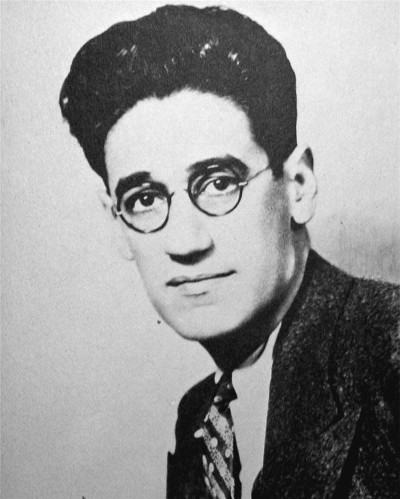George Kaufman (George Simon Kaufman)

Born to a Jewish family in Pittsburgh, Pennsylvania, he graduated from high school in 1907 and “tried law school for three months” but grew disenchanted and took on a series of odd jobs, including “selling hatbands”. George Kaufman then began his career as a journalist and drama critic; he was the drama editor for The New York Times from 1917 through 1930. George Kaufman took his editorial responsibilities very seriously. According to legend, on one occasion a press agent asked: “How do I get our leading lady’s name in the Times?” Kaufman: “Shoot her.” He worked with Moss Hart in 1930 on the Broadway hit “Once in a Lifetime” and also with Hart, wrote “You Can’t Take it With You” and “The Man Who Came to Dinner”. George Kaufman’s Broadway debut was September 4, 1918 at the Knickerbocker Theatre, with the premiere of the melodrama Someone in the House. He coauthored the play with Walter C. Percival, based on a magazine story written by Larry Evans. The play opened on Broadway (running for only 32 performances) during that year’s serious flu epidemic, when people were being advised to avoid crowds. With “dour glee”, Kaufman suggested that the best way to avoid crowds in New York City was to attend his play. In every Broadway season from 1921 through 1958, there was a play written or directed by George Kaufman. Since Kaufman’s death in 1961, there have been revivals of his work on Broadway in the 1960s, the 1970s, the 1980s, the 2000s and the 2010s. George Kaufman wrote only one play alone, The Butter and Egg Man in 1925. With Marc Connelly, he wrote Merton of the Movies, Dulcy, and Beggar on Horseback; with Ring Lardner he wrote June Moon; with Edna Ferber he wrote The Royal Family, Dinner at Eight, and Stage Door; with John P. Marquand he wrote a stage adaptation of Marquand’s novel The Late George Apley; and with Howard Teichmann he wrote The Solid Gold Cadillac. According to his biography on PBS, “he wrote some of the American theater’s most enduring comedies” with Moss Hart. Their work includes Once in a Lifetime (in which he also performed), Merrily We Roll Along, The Man Who Came to Dinner and You Can’t Take It with You, which won the Pulitzer Prize in 1937.
For a period, George Kaufman lived at 158 West 58th Street in New York City. The building later would be the setting for Stage Door. It is now the Park Savoy Hotel and for many years was considered a single room occupancy hotel. George Kaufman directed the original or revival stage productions of many plays and musicals, including:The Front Page by Charles MacArthur and Ben Hecht (1928), Of Thee I Sing (1931 and 1952), Of Mice and Men by John Steinbeck (1937), My Sister Eileen by Joseph Fields and Jerome Chodorov (1940), Hollywood Pinafore (1945), The Next Half Hour (1945), Park Avenue (1946, also co-wrote the book), Town House (1948), Bravo! (1948, also co-wrote the script), Metropole (1949), the Frank Loesser musical Guys and Dolls, for which he won the 1951 Best Director Tony Award, The Enchanted (1950), The Small Hours (1951, also co-wrote the script), Fancy Meeting You Again (1952, also co-wrote the script), The Solid Gold Cadillac (1953, also co-wrote the script), and Romanoff and Juliet by Peter Ustinov (1957). George Kaufman produced many of his own plays as well as those of other writers. For a short time, approximately from 1940 to circa 1946, Kaufman, with Moss Hart and Max Gordon, owned and operated the Lyceum Theatre. George Kaufman was married to Beatrice Bakrow from March 15, 1917, until her death on October 6, 1945. They had one daughter, Anne Kaufman (Booth). Four years later, he married actress Leueen MacGrath on May 26, 1949, with whom he collaborated on a number of plays before their divorce in August 1957. Kaufman died in New York City on June 2, 1961, at the age of 71. His granddaughter, Beatrice Colen, was an actress who had recurring appearances on both Happy Days and Wonder Woman.
Born
- November, 16, 1889
- USA
- Pittsburgh, Pennsylvania
Died
- June, 02, 1961
- USA
- New York, New York
Other
- Cremated

